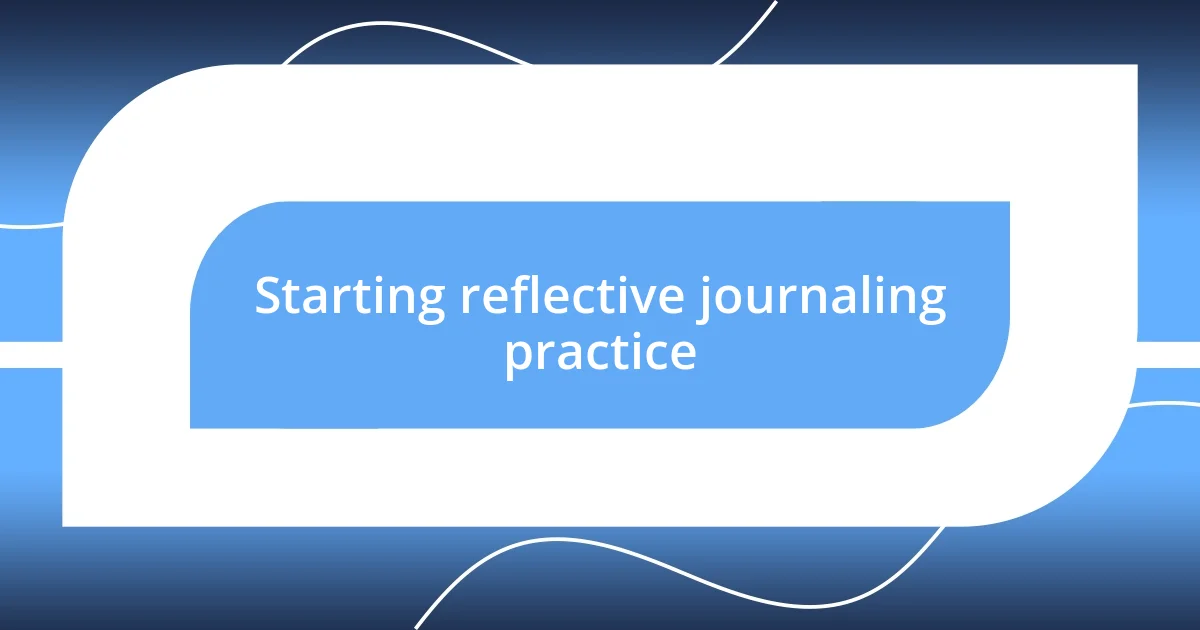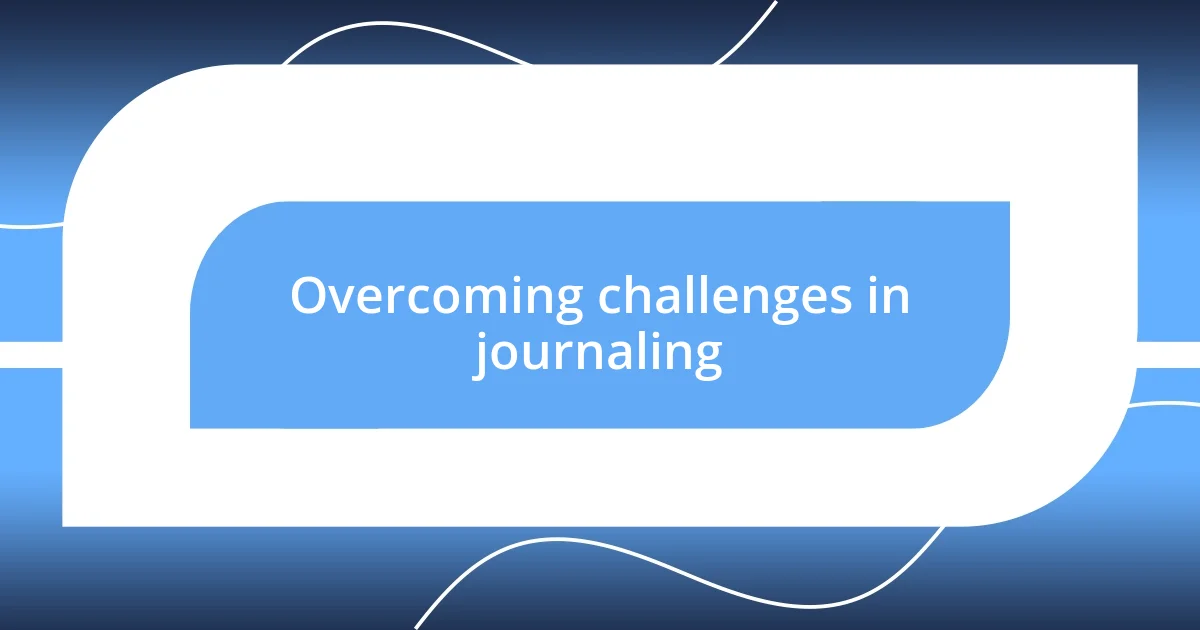Key takeaways:
- Reflective journaling enhances self-awareness, emotional regulation, and personal growth by helping individuals understand their thoughts and feelings better.
- Practical tips for starting a reflective journaling practice include choosing a consistent time, writing simply and honestly, and occasionally reviewing past entries for insight.
- Overcoming challenges in journaling, such as writer’s block and fear of judgment, involves embracing spontaneity, authenticity, and recognizing the value of inconsistency in the writing process.

Understanding reflective journaling benefits
Reflective journaling has been a game changer for me in understanding my thoughts and emotions better. I remember feeling overwhelmed during a particularly stressful period at work. Taking the time each evening to jot down my experiences and feelings helped me untangle the chaos in my mind, allowing clarity to emerge amidst the confusion.
One of the most profound benefits I’ve experienced is increased self-awareness. By reflecting on my daily interactions, I began to notice patterns in my behavior that I had previously overlooked. Have you ever found yourself in a situation where you wondered why you reacted a certain way? Through journaling, I’ve been able to explore those moments more deeply, leading to personal growth and improved decision-making.
Additionally, I’ve found that reflective journaling fosters emotional regulation. There were times when I felt sadness or frustration, and putting those feelings on paper transformed my emotional landscape. It’s like turning the lights on in a dark room—suddenly, everything becomes more manageable. Isn’t it amazing how simply writing can help you navigate your emotional world?

Starting reflective journaling practice
Starting a reflective journaling practice doesn’t require a grand setup. I began with a simple notebook and a comfortable spot in my home—that’s where the magic began to happen. The key for me was consistency; I set aside a few minutes each night to write, creating a habit that felt both intentional and calming.
Here are some practical tips for getting started:
– Choose a time: Find a quiet moment in your day that works for you—maybe it’s just before bed or during your morning coffee.
– Keep it simple: You don’t need elaborate prompts; sometimes, just reflecting on your day or a specific feeling is enough.
– Be honest: Write without judgment or concern about grammar. This is your safe space to explore.
– Set a goal: Consider focusing on one theme for a week, like gratitude or challenges, to deepen your insights.
– Review your entries: Occasionally looking back at what you’ve written helps to recognize your growth over time.
When I embraced these tips, my journaling sessions turned into an enriching experience—like having a heart-to-heart conversation with a trusted friend. Each entry became a mirror reflecting my inner world, and I felt more connected to myself with every stroke of the pen.

Techniques for effective journaling
I’ve learned that there are specific techniques that can elevate your journaling experience significantly. One of my favorites is free writing. This technique involves setting a timer for about 10 minutes and writing continuously without stopping to edit or censor yourself. The first time I tried it, I was surprised by the flood of thoughts that poured out. It’s liberating—allowing your mind to run free can reveal insights you didn’t realize were there. Have you ever felt overwhelmed with ideas? Free writing can help you clear that mental clutter.
Another effective technique is using prompts or questions to guide your reflection. I often pick a question like “What challenged me today?” or “What brought me joy?” Writing with focus can channel your thoughts in a productive way. I remember a particularly challenging day when I was struggling with a decision; reflecting on a simple prompt helped me articulate my feelings and priorities. It felt like shining a flashlight into a dark corner of my mind, illuminating the path forward.
Incorporating visuals into your journaling can also enhance your experience. I sometimes doodle or add colors to my entries, as it makes my thoughts feel more vibrant and alive. This not only helps me tap into my emotions but also turns the process into a creative outlet. I find that on days when words feel inadequate, images can express what I’m feeling. By mixing forms of expression, you’re creating a richer tapestry of your experiences.
| Technique | Description |
|---|---|
| Free Writing | Set a timer and write continuously for a short period without editing. It encourages spontaneous thinking and often reveals unexpected insights. |
| Guided Prompts | Use specific questions or prompts to direct your reflection. This gives you a focused way to explore deeper thoughts and feelings. |
| Visual Elements | Incorporate doodles, sketches, or colors into your journaling to enrich the narrative and express emotions that words sometimes can’t capture. |

Overcoming challenges in journaling
I’ve faced my fair share of challenges while journaling. Sometimes, the blank page seems daunting, like I’m staring into a void waiting for inspiration to strike. One night, I simply couldn’t find the words and ended up doodling instead. That spontaneity led to me expressing my feelings in a way that words failed to capture. It’s interesting how shifting the medium can help unlock thoughts we didn’t even know were hiding in our subconscious. Have you ever felt stuck?
Another hurdle I encountered was the fear of judgment. I used to worry that my thoughts weren’t “deep” enough or that my handwriting lacked elegance. I realized that my journal is my sanctuary—a space free from scrutiny. Allowing myself to write freely without the pressure of perfection transformed my experience. Acknowledging that I could be raw and authentic brought a sense of liberation. What would it look like for you to let go of those standards?
I also discovered the importance of embracing inconsistency in my writing. There were weeks when I wrote daily, and others when I barely touched my notebook. Instead of feeling guilty, I learned to accept those fluctuations as part of the journey. One particularly busy week, I recorded only snippets and bullet points, but those mini reflections still held value. It made me realize that journaling doesn’t have to be a strict routine; it can adapt to my life. How can you find freedom in your journaling practice?

Analyzing journal entries for growth
Reflecting on my journal entries has been a powerful catalyst for personal growth. I remember a phase when I was grappling with anxiety after rereading certain entries, I noticed patterns emerging that I hadn’t recognized before. It felt like piecing together a puzzle of my emotions. Have you ever looked back at your thoughts and seen how far you’ve come? This self-analysis reminds me that growth often comes from recognizing past struggles.
One particularly enlightening moment occurred when I began categorizing my entries into themes—like relationships, work challenges, and personal goals. This simple act of organizing my thoughts not only helped me see areas where I needed to focus, but also revealed connections that illuminated my journey. For instance, I found that my work stress often mirrored my personal anxieties. Drawing these parallels provided clarity and a sense of direction on what I needed to address. Isn’t it fascinating how our thoughts can converge in ways we hadn’t previously considered?
I also learned the importance of setting intentions after analyzing my entries. Each time I reflect, I try to ask myself what I want to achieve moving forward. One evening, I recognized that multiple entries cited feelings of overwhelm. This prompted me to create actionable steps to manage my stress better, such as incorporating mindfulness practices. The realization that my written reflections could lead to tangible changes in my life was empowering. How might your journal entries shape your future experiences or decisions?

Tips for maintaining consistency
To maintain consistency in journaling, setting a specific time each day or week can work wonders. For me, mornings became my sacred journaling hour. I found that this routine not only prepares my mind for the day but also eliminates the chaos of scheduling it later. Have you ever tried establishing a designated time? It can transform writing from a chore into a cherished ritual.
Another tip is to simplify the process. I often keep prompts handy that inspire me when my mind feels blank. For instance, I’ve created a list of questions that resonate with me, like “What made me smile today?” or “What challenges did I face?” These small nudges help maintain my momentum. Isn’t it comforting to have a few guiding questions to prompt your thoughts?
Lastly, I recommend celebrating small wins. When I hit a streak of writing consistently, I treat it as a personal victory. It doesn’t have to mean grand milestones; even a week of daily journaling feels like a cause for joy. How do you acknowledge your progress? Recognizing these moments fosters motivation and reinforces the value of my journaling journey.














